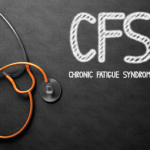 DNA methylation plays an important role in the interplay between environment and gene expression. Because differential methylation of promoters can affect the expression of corresponding genes, methylation patterns may provide insight into the pathophysiology of multisystem complex diseases, such as myalgic encephalomyelitis/chronic fatigue syndrome (ME/CFS). Researchers are particularly interested in methylation patterns in ME/CFS patients because transcriptional profiling studies in this patient population have revealed perturbations in T cell and B cell activation, as well as dysregulation in interleukins and interferons.
DNA methylation plays an important role in the interplay between environment and gene expression. Because differential methylation of promoters can affect the expression of corresponding genes, methylation patterns may provide insight into the pathophysiology of multisystem complex diseases, such as myalgic encephalomyelitis/chronic fatigue syndrome (ME/CFS). Researchers are particularly interested in methylation patterns in ME/CFS patients because transcriptional profiling studies in this patient population have revealed perturbations in T cell and B cell activation, as well as dysregulation in interleukins and interferons.
A recent study by Malav S. Trivedi, PhD, of Nova Southeastern University, Fort Lauderdale, Fla., and colleagues has explored the genome-wide epigenetic changes associated with ME/CFS. The investigators used advanced Infinium MethylationEPIC microarrays that covered approximately 850,000 CpG sites in two geographically distant cohorts of ME/CFS cases, as well as matched controls. Their results were published July 23 in PLOS One.1
“We identified differentially methylated CpG sites and promoters in PBMCs [peripheral blood mononuclear cells] of ME/CFS cases compared with controls in cohorts from two distant geographic locations,” write the authors in their discussion. “Association of hypomethylation of DMPs [differentially methylated promoters] with immune regulatory pathways is in agreement with previous studies. Those previous studies found immune cell regulation as the largest coordinated enrichment of differentially methylated pathways and reported genomic DNA hypomethylation of genes in immune pathways from PBMCs isolated from ME/CFS cases and also in CD4+ T cells from ME/CFS cases.”
Although the investigators found global DNA methylation levels of ME/CFS patients were like those of controls, they identified 17,296 differentially methylated CpG sites in 6,368 genes that included both regulatory elements and coding regions of genes. When they looked specifically at DNA methylation in promoter regions, they found 307 differentially methylated promoters, including hypomethylation of promoters of genes related to RNA binding proteins, homeobox and plant homeodomain finger proteins. When the researchers performed an ingenuity pathway analysis, they found the genes associated with differentially methylated promoters participated in at least 15 different pathways, most of which were related to cell signaling and had a strong immune component. In particular, the team documented hypomethylation of the IL21R gene promoter, a finding that suggests increased expression of the IL21 receptor.
“It is noteworthy to mention that it is still inconclusive from previous studies or our current study, whether the significant epigenetic modifications found to associate with ME/CFS indicate a compensatory homeostatic mechanism or result from an adaptive immune response towards environmental inducers,” acknowledge the authors. “However, these results indicate DNA methylation constitutes a potential gene regulatory mechanism capable of mediating long-term changes in ME/CFS cases, as previously noted by other authors.”


